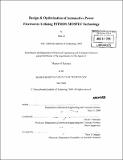Design & optimization of automotive power electronics utilizing FITMOS MOSFET technology
Author(s)
Li, Wei, Ph. D. Massachusetts Institute of Technology. Department. of Electrical Engineering and Computer Science.
DownloadFull printable version (43.45Mb)
Alternative title
Design and optimization of automotive power electronics utilizing FITMOS MOSFET technology
Other Contributors
Massachusetts Institute of Technology. Dept. of Electrical Engineering and Computer Science.
Advisor
David J. Perreault.
Terms of use
Metadata
Show full item recordAbstract
Power electronics are essential to many automotive applications, and their importance continues to grow as more vehicle functions incorporate electronic controls. MOSFETs are key elements in automotive power electronic circuits and MOSFET characteristics can strongly affect circuit size, cost and performance. Advances in MOSFET technology are thus of great importance to the advancement of automotive electronics. The new Floating Island and Thick Bottom Oxide Trench Gate MOSFET (FITMOS) developed at Toyota has tremendous potential for automobile applications due to its reduced on-resistance, improved temperature coefficient of resistance and reduced gate charge and input capacitance. In this research, we investigated the detailed characteristics of FITMOS devices, developed the SPICE model for simulation and explored their applications in the design of automotive power electronics. Specifically, we identified how to best utilize the FITMOS characteristics to benefit power circuit design and on quantifying the gains that can be achieved through their use. We also expose a previously unrecognized phenomenon in the FITMOS MOSFET. In particular, we show that the on-state resistance of the device depends on both frequency and on peak di/dt at a given frequency. This dynamic on resistance variation can have a significant application impact.
Description
Thesis (S.M.)--Massachusetts Institute of Technology, Dept. of Electrical Engineering and Computer Science, 2009. Cataloged from PDF version of thesis. Includes bibliographical references (p. 178-179).
Date issued
2009Department
Massachusetts Institute of Technology. Department of Electrical Engineering and Computer SciencePublisher
Massachusetts Institute of Technology
Keywords
Electrical Engineering and Computer Science.